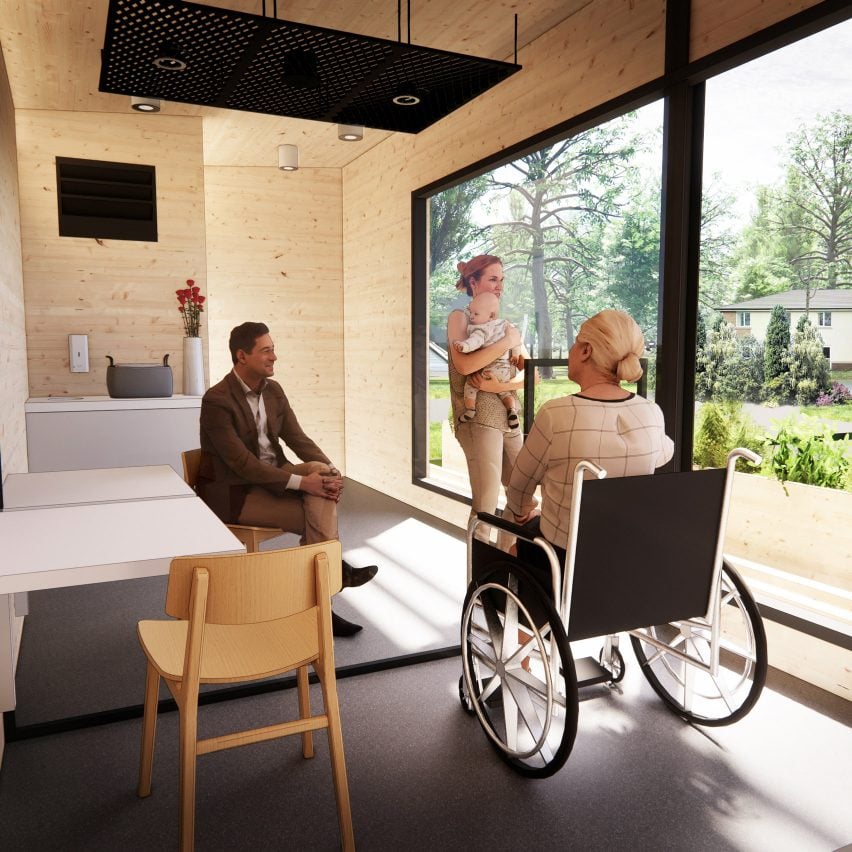
Architecture firm Scott Brownrigg has developed a concept for a pod with a transparent divider to allow people to meet vulnerable relatives safely, plus today's other design-related coronavirus news.
Called the Social Contact Pod, the prefabricated structure would allow families with vulnerable relatives to meet without putting each other at risk of transmitting disease.
A perspex wall divides the room in two to create full visual contact. Metal ceiling panels with integrated speakers would transmit sound across the barrier for conversation.
"It is lightweight, rapidly constructed and is easily transported on the back of a standard truck or pulled on a trailer," said Scott Brownrigg.
"Importantly, it's been designed to be fully sustainable so that pods can be repurposed or recycled with relative ease when they are, hopefully, no longer needed."
Scott Brownrigg included a panel of more flexible plastic in the perspex screen to allow users to hold hands without skin contact.
Isolation is hard on friends and family who have to remain separate to cut the risk of transmitting the virus, which spreads from person to person via droplets from the nose and mouth.
Until a vaccine is created, people who are over the age of 70, or who have pre-existing health conditions, will need to reduce their contact with anyone outside their immediate household.
With society having to rapidly adjust to balance public health with the need for human connection, Scott Brownrigg developed the Social Contact Pod with engineers Ramboll and Hoare Lea to ask how architecture can help people temporarily adjust their behaviour.
The pod, which has ramps for accessibility, would include handle-less doors, hygienic floors and an air purging system to flush it between uses.
Here are five more coronavirus-related architecture and design news stories from today:
Coronavirus daily briefing
Dubai Expo postponed to 2021
The Dubai Expo 2020 is the latest global event delayed by coronavirus, with its opening date pushed back to October 2021 (via Al Jazeera).
Virtual city built in an Oxford University lab shows how the tracing app could work
A model city built by scientists at Oxford University is being used to model to test the technology of a smartphone app to track and alert people if they have come into contact with an infected person (via The Times – subscription).
"The cruelness of demolishing LACMA when Angelenos are unable to bear witness should not be ignored"
With the demolition of Los Angeles County Museum of Art underway for Peter Zumthor's redesign, Mimi Zeiger is concerned about what will be left for the city and its residents following coronavirus lockdown (via Dezeen).
Studio Natalie researching local materials for interiors projects after being stranded on coral island
In the most exotic VDF video message we received, interior designer Natalie Papageorgiadis explains how she found herself stranded in the Maldives as the world went into lockdown due to coronavirus (via Dezeen).
Street design will change in the age of social distancing
Green Party London Assembly member Caroline Russell has outlined how streets and cities will change following the coronavirus pandemic (via Architects' Journal).
The post Scott Brownrigg's Social Contact Pod would let people visit vulnerable family during pandemic appeared first on Dezeen.
from Dezeen https://ift.tt/35z5gC4
No comments:
Post a Comment